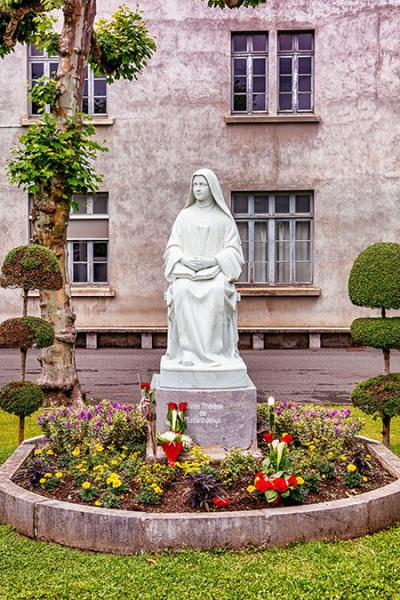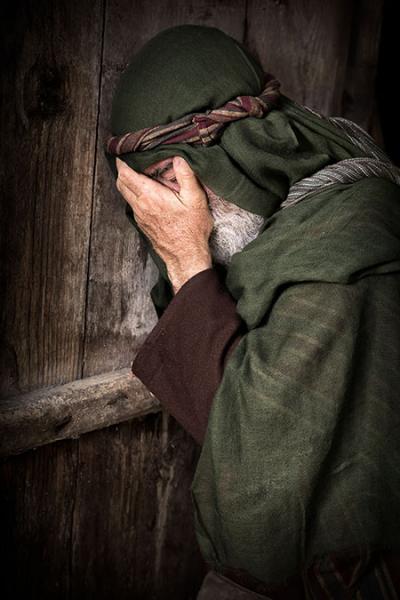How does belief in the final resurrection from the dead affect your family’s daily life?
by Mary Sellars MalloyEarlier this year, when travel was still safe and life was at its usual pace, I traveled to San Antonio to lead a day-long retreat on Mary and the saints. One of the retreat day segments focused on the Communion of Saints: the pilgrims on Earth, the souls in Purgatory, and the saints in Heaven. Together, we are one family of faith caught up in a great procession to the heavenly kingdom, and our mission is to help each other reach our heavenly home.
As we live with the reality and the impact of the coronavirus, living out our shared mission becomes all the more important. What if, each day, we simply looked to our left and our right, before us and behind us, to see who needs help, encouragement, a friend, shelter, and love? What if we reached out a hand to help the struggling and the lost return to or join the great procession? In the words of “The Servant Song” (Richard Gallard): “We are pilgrims on a journey, we are trav’lers on the road; we are here to help each other walk the mile and bear the load.”
Belief in the final resurrection, belief in eternal life with God and the saints and angels in Heaven, puts this short earthly journey and trials such as the current pandemic into perspective. This is not our home. The pain, suffering, and challenges we may face while here are but moments in the span of time. When death separates us from those we love, we are certain in hope that we will one day be reunited in Heaven. This is what motivates us to keep moving forward with others on the journey, striving to make it to that kingdom where our loved ones and all the saints have gone before us are extending their hearts and their hands—praying for us, cheering us on, and leading us home.
I’ve always been fascinated by the story of Jonah and the Whale.
As a child, reading my full-color illustrated book of Bible stories, I was most interested in how Jonah got in the whale and what it might have been like for him sitting in the whale’s belly for three days. I never questioned the veracity of the story because, after all, if God can create a universe, God can certainly arrange for an errant Jonah to have a time-out in a most unusual place.
As I grew older, I thought more about how Jonah, the reluctant prophet, ended up in trouble because he tried to run away from God, and I often thought my life was going in a similar direction. If I didn’t stop disobeying what I knew God was telling me to do, or not to do, I could end up underwater myself.
As a college student, reading the classics, I found myself wondering if Jonah ever felt like Francis Thompson, the English poet who wrote the exquisite poem “The Hound of Heaven,” which describes an unrelenting God pursuing a soul seeking to hide, as a hound relentlessly follows a hare.
As an adult, I have learned that there is more to the story than a man running from God and ending up in the belly of a big fish. The essential element of the story is the “why.”
God had a job for Jonah to do – to preach repentance to the Ninevites, whose reputation for evil was known to God. Jonah didn’t want to be that prophet so he ran from God and tried to sail away to Tarshish. While he slept in the hold of the ship a storm arose and the seas threatened to capsize the boat.
The sailors figured out that Jonah was fleeing from his God, so to appease God they threw Jonah overboard and the storm ceased. But God saved Jonah by providing a big fish that swallowed him and kept him safe for three days – the length of time it took Jonah to repent for running away.
God heard Jonah’s prayers and commanded the fish to spit Jonah up on the shore so Jonah could finally undertake the task God asked of him – to go to Nineveh and preach to the Ninevites so they would change their ways and turn back to God.
Jonah preached and the Ninevites listened. Everyone, including the king, fasted, put on sackcloth and ashes and repented. Scripture says, “When God saw by their actions how they turned from their evil way, he repented of the evil he had threatened to do to them; he did not carry it out.”
And Jonah was angry. His reaction was essentially, “I knew this was going to happen!” Jonah admitted to God this was the “why,” the reason he ran away from God in the first place. He didn’t want God to forgive these enemies of Israel.
Jonah responded to God, “O Lord, is this not what I said while I was still in my own country? This is why I fled at first toward Tarshish. I knew that you are a gracious and merciful God, slow to anger, abounding in kindness, repenting of punishment. So now, LORD, please take my life from me; for it is better for me to die than to live.”
God simply asked, “Are you right to be angry?”
Reflecting on my own life, I realize I had to learn the difference between being angry at others’ bad behavior and being angry at the thought of God treating them with mercy and forgiveness should they repent.
There are times when I am like Jonah, not yet ready to forgive. But with God following on my heels, I may get there eventually.
Mary Regina Morrell is a Catholic journalist, author, and syndicated columnist who has served the dioceses of Metuchen and Trenton, New Jersey, and RENEW International in the areas of catechesis and communication.
Following a recent car trip, my daughter-in-law shared a memorable moment she had with one of my granddaughters – a child known for her precocious insights, which she doesn’t hesitate to share.
As they drove past the cemetery, an adult friend told a joke to the two girls. “Why is there a fence around the cemetery?” she asked. After a minute of no responses, she quipped, “Because people are dying to get in!”
The adults had a good laugh in the front seat, but a few minutes later, my young granddaughter said, “Mama, do you remember your grandmother?”
“Of course,” my daughter-in-law replied.
“She’s dead, isn’t she?” asked the seven-year-old.
A moment of silence ensued, recalled my daughter-in-law, noting her daughter’s words weren’t so much a question as a statement; one that was chastising her for laughing at a joke about death.
In her little heart she seemed to understand that the living are still connected to the dead in some way – especially when we have loved them or they us.
“Church tradition has always urged prayer for the dead, in particular by offering the celebration of the Eucharist for them; it is the best spiritual help that we can give to their souls, particularly to the most abandoned ones,” said Pope Francis.
We can enter into that tradition by including a spiritual work of mercy to our Lenten practice – praying for the living and the dead who are all members of the Body of Christ and the Communion of Saints.
Prayer is one of the most powerful ways we can support others, both those who accompany us on this earthly journey, and those who have died. By praying for the dead we help ourselves to grieve and support them in their new life.
Prayer also expands our hearts, helps us heal broken relationships, even with those who have died, and encourages us to move outside ourselves and our needs in order to focus on the needs of others.
Mary Regina Morrell is a Catholic journalist, author, and syndicated columnist who has served the dioceses of Metuchen and Trenton, New Jersey, and RENEW International in the areas of catechesis and communication.
You never know what’s going to send a child into a meltdown.
Last week it was a box of crayons, 16-count to be exact.
My two-year-old grandson dropped it on the floor and we didn’t notice that one rolled under the couch.
I helped him pick them all up and when we were done, one was still missing. I told him not to worry, it was just one crayon. I tried to close the box to put them away and then the tears started. “No!” he exclaimed, attempting to pull the box from my hands.
He was as upset as any two-year-old can get and adamant that we could not close the box without the missing crayon. He felt the incompleteness of it. Just one crayon, but one crayon that counted.
So when I was assigned to write a newspaper article on the census, I found it more than coincidental. The main gist of the story was why it’s important for everyone to participate, and how many faith-based entities are offering programs to educate and assist hard-to-count populations to participate.
I interviewed a number of public officials and program administrators who shared their wisdom and expertise about the process of the census, which is mandated by the U.S. Constitution to take place every 10 years. But one person’s very simple yet profound statement evidenced the bottom line for me.
He said, “The most important reason for everyone to participate in the census is because, as children of God, everyone counts.”
When I hear those words in my head even now, I get choked up, because when I watch the news or even experience, in word and deed, how some of us strive to belittle others, it hurts my heart.
This is not what Jesus taught us. It is not what he prayed for, and I believe “counting out” others would break his heart too. In the Gospel of Matthew, Jesus laments over Jerusalem, saying, “Jerusalem, Jerusalem, you who kill the prophets and stone those sent to you, how many times I yearned to gather your children together, as a hen gathers her young under her wings, but you were unwilling.”
Jesus, fully human and fully divine, expressed a wide range of emotions, including joy, frustration, anger, sadness, and grief. I have to believe that in seeing how we so often treat each other, the Jesus of Scripture would grieve.
Writing an article inevitably leads me to some self-reflection, so It seemed that Lent would be an appropriate time for me to reflect on the question, “Who counts in my life?” beginning with my family and expanding out to my friends, the broader community and other countries. One lesson came from paying attention to the posts I skimmed over on Facebook. It was a hard reality to face.
When you come to the realization that you have a lot of work to do in order to live your faith the way you should, it can be overwhelming and often leads to justification as to why change is not necessary. We may fool ourselves but we certainly can’t fool God.
But where do we start? With the children.
It may be hard for us to make a personal change right away, but we can certainly make sure our children grow up learning that every person has inherent dignity and is loved by God.
Or maybe it is the children who will teach us, with a box of crayons.
Mary Regina Morrell is a Catholic journalist, author, and syndicated columnist who has served the dioceses of Metuchen and Trenton, New Jersey, and RENEW International in the areas of catechesis and communication.(August 18, 2019) Lectionary: 120
Thomas GetteAdults: When has your taking a strong stand on a moral issue created division rather than healing in the short term?
Children: Is it important to do the right thing even if others are angry as a result? Why or why not?
When I was first coming into the faith, I was kind of zealous and arrogant about the newfound truths I was discovering. As a result, I was causing divisions, but for double reasons: the truths themselves and my attitude of how I defended those truths. I became almost prideful because of the truths. The truths mattered so much to me that I thought this was all that mattered. It was now plain for me to see, so I thought it should be simple to make it plain for others to see. Much to my surprise, no one was interested.
But thankfully things changed. In the long run, living humbly and faithfully made a real impact. I allowed the truths to move from my head to my heart and transform me more deeply day by day. Instead of being so assertive and abrasive, I began to preach the truths by living a life that showed that I believe them. The commitment over time showed I was serious, and the change in me showed the truths mattered on a deeper level. Instead of obstinance, this eventually led to understanding and acceptance from family and friends, and even imitation and curious searching.
 We all take a stand on things that are important to us. Some of those things matter more than others. Some so much that we are willing to let people be upset with us. No matter how much my life was transformed by grace and truth, there was still strong resentment from some people because I was associating with the Catholic Church. I realized that I could not please everyone. I had to learn to be OK with certain people being toxically opposed to me.
We all take a stand on things that are important to us. Some of those things matter more than others. Some so much that we are willing to let people be upset with us. No matter how much my life was transformed by grace and truth, there was still strong resentment from some people because I was associating with the Catholic Church. I realized that I could not please everyone. I had to learn to be OK with certain people being toxically opposed to me.
There are some things that matter more than relationships. God’s truths matter above all and should be our guiding point. But our commitment to these truths determines a lot. In Ephesians 5:14, St. Paul tells us “... speaking the truth in love, we are to grow up in every way into him who is the head, into Christ.” The truth might hurt for some to hear, but we can’t let pride and self-righteousness be what causes the hurt. We must grow in holiness as a way to proclaim the truth.
This division over the faith is something that Jesus warned us about. From this Sunday’s Gospel he explicitly tells us he came to bring division. But he did not come for the sake of division. What he was expressing was that the truths he came with would inevitably cause division. We can think of this like a surgery. A doctor does not perform surgery just to cut a person open. However, in order to perform the surgery, the cutting open is required.
So, when we are faced with doing the right thing, or not wavering on a belief we hold, we must remember that division and anger is a possibility (at least in the short term). However, we must ensure we do not cause division or anger because of a lack of love. “Beloved, let us love one another; for love is of God, and he who loves is born of God and knows God” (1 John 4:7).
Thomas Gette is a family man with a passion for the domestic Church. He holds master’s degrees from both Franciscan University and the Catholic University in Leuven, Belgium.(August 11, 2019) Lectionary: 117
by Thomas GetteAdults: Other than Jesus, which of the ancestors of Christian faith has served as the greatest example to you? Why?
Children: Which person of the Bible has been a good example to you of how to live?
One of the fascinating things about Catholicism is the enduring impact of the people who have come before us. Wealthy and famous people often have some kind of legacy, but it no way compares to how the writings and the lives of the saints are perennially celebrated and imitated.
Someone like Steve Jobs may have left a seismic impact on the world and have a name that is almost universally recognizable, but there will never be widespread devotion to following his teachings and imitating his virtues.
 Take for example St. Thérèse of Lisieux (a saint who has had a major impact on my spiritual life). She was born in France in 1873. At the age of 15 she entered the convent at the unusually young age of 15. From there she lived a relatively obscure life hidden from the world as a cloistered nun. She met an untimely death at only the age of 24. But for whatever reason, the holiness she embraced during her short life sent spiritual ripples.
Take for example St. Thérèse of Lisieux (a saint who has had a major impact on my spiritual life). She was born in France in 1873. At the age of 15 she entered the convent at the unusually young age of 15. From there she lived a relatively obscure life hidden from the world as a cloistered nun. She met an untimely death at only the age of 24. But for whatever reason, the holiness she embraced during her short life sent spiritual ripples.
From only as recently as the late 1800s, a virtual worldwide devotion to her has developed. It is hard to find a Catholic parish that does not have a statue or image of her. There is a basilica dedicated to her that is the second most popular pilgrimage site in France. Pope St. Pius X regarded her as “the greatest saint of modern times.”
How does a young girl who lived a life in the hidden silence of a cloistered convent become so widely known? And how has a popular devotion and spiritual piety inspired by her life and writings developed so readily?
There is something powerful about humility and a life dedicated to God. Think of any saint or biblical figure, and the impression they left on the world is unmistakable. And this isn’t because they were great technological innovators or authors or artists or because they acquired a great fortune and fame. They have become the people we remember and imitate because they let their lives be defined by following God’s will. This shows us that when we embrace God’s plan for our lives, we make the biggest (and better) impact on the world.
What’s fascinating to think about is that, essentially, only saints have this characteristic. We imitate these holy men and women because they loved God and lived according to God’s universal truth. We do so in order to become saints ourselves. And though we aren’t all destined to become canonized saints, our aim in life should be virtue and goodness. Fortune and fame and the things of this world fade, but love endures forever.
Thomas Gette is a family man with a passion for the domestic Church. He holds master’s degrees from both Franciscan University and the Catholic University in Leuven, Belgium.(April 14, 2019) Lectionary: 37/38
by Thomas GetteAdults: When have you felt that you betrayed the confidence of another, as Peter did when he denied Jesus?
Children: When have you let someone down who trusted you? How did you feel?
Have you ever witnessed the protest of a child who was promised something that he or she did not receive?
When a promise of “you can have dessert once you eat dinner,” doesn’t result in dessert, a tantrum is likely! Children have a natural ability to trust, but when that trust is broken, they have an equally natural ability to express how hurt they are.
The close relationships we build in our lives naturally contain this element of trust. Our inclination is to take each other at our word. In a healthy marriage, for example, a husband and wife leave no room for doubt at the other’s words or actions – there is simply an innocent assumption that they would never betray each other, where even gossip and rumors are easily dismissed as untrue.
It is a very normal and natural human thing to invest this trust in others, especially in those with whom we have an intimate bond, which is precisely why betraying another’s confidence in us is such a troubling affair.
 The story of Peter’s threefold denial of Jesus helps us see how even God puts this kind of confidence and trust in us. As Jesus was being scourged and beaten on his way to the crucifixion, he also was inflicted with a deep wound by his friend and follower denying him.
The story of Peter’s threefold denial of Jesus helps us see how even God puts this kind of confidence and trust in us. As Jesus was being scourged and beaten on his way to the crucifixion, he also was inflicted with a deep wound by his friend and follower denying him.
When we commit our lives to God, it is much the same as any of our human relationships. God expects fidelity; God expects us to follow him and live for him wholeheartedly. Thus, it pains God when we break that trust and harm our relationship with him. We, of course, call this breaking of God’s trust sin, and we can envision each betrayal as another wound endured by Christ on Good Friday.
However, there is good news that lies precisely in why we call that infamous day “Good” Friday. Jesus endured the pains of suffering and death in order to conquer it. It is a loud message to us that at any cost he wants to free us from our sins and repair our relationship with him.
Saint Paul wrote in 2 Timothy 2:13, “If we are faithless, he remains faithful.” No matter what we do (even denying Jesus as did Peter), God remains as the only one in our lives who will not betray us. God is always there, waiting for us to have a change of heart.
Our human relationships might not be as straightforward as this, as we are not able to forgive with God’s capacity, but Jesus nevertheless is our model to imitate. If someone betrays our trust, we learn from Jesus to offer forgiveness and allow others the chance to rebuild our trust in them.
On the flip side, if we betray someone’s trust (like Peter in denying Jesus), we must learn to seek forgiveness, fix our mistake and rebuild trust.
Ironically, we shouldn’t be surprised when betrayal happens. We are fallen humans after all. But the Gospel is here to teach us how to respond with love and mercy at life’s sometimes unfortunate inevitabilities.
Thomas Gette is a family man with a passion for the domestic Church. He holds master’s degrees from both Franciscan University and the Catholic University in Leuven, Belgium.When my youngest son decided to move from New Jersey to Michigan to make a new start for his life journey, I resigned myself to his decision, but I cried. I would miss him terribly.
Almost a year later, as I began planning for Christmas, I came across a unique pocket compass. I bought it to put in his Christmas stocking and added a little note about always being able to find his way home. I wanted to support him in his decision, but remind him that his family would always be his home.
Unexpectedly, serious back issues forced him to return home where he was able to heal with the expert care of our family chiropractor and the support of the family who loves him. He has been pain-free for almost two years and has moved forward with his life, starting a new job which he loves, finding a new apartment, and being grateful for a new lease on life.
He has learned a lot on his journey, including the realization that Michigan just wasn’t his cup of tea. He shared that he would have returned home within the year even if his back hadn’t caused him such problems.
 I thought of the compass and the meaning of returning home.
I thought of the compass and the meaning of returning home.
During his Ash Wednesday homily, Pope Francis recalled, “Jesus said: ‘Where your treasure is, there will your heart be also’ (Mt 6:21). Our heart always points in some direction: it is like a compass seeking its bearing.”
The Holy Father reminded us that “Lent is the time to rediscover the direction of life. Because in life’s journey, as in every journey, what really matters is not to lose sight of the goal. ...We should ask ourselves: On the journey of life, do I seek the way forward?... The Lord is the goal of our journey in this world. The direction must lead to him.”
As we prepare for Palm Sunday, we recall that Jesus’ journey home to God took him into Jerusalem, where palm branches and joyful shouts of Hosanna! would soon turn to suffering and death. Still, Jesus never lost sight of the goal.
Soon, Lent will draw to a close, and we will head into Holy Week, but we may continue to ask ourselves if we are allowing our faith in God to lead us true north as we navigate our daily lives.
Are we on our way home to God, or have we lost our way? Have we lost sight of what’s important, what’s eternal, what makes a difference in our lives, in our families and in our world?
Every pilgrim needs a compass.
Mary Regina Morrell is a Catholic journalist, author, and syndicated columnist who has served the dioceses of Metuchen and Trenton, New Jersey, and RENEW International in the areas of catechesis and communication.(April 7, 2019) Lectionary: 36
by Thomas GetteAdults: Have you ever been too willing to “cast the first stone” when you disapprove of someone’s behavior? How can you resist these feelings?
Children: When have you criticized or made fun of someone? What could help you act differently?
 Remember the parable of the Pharisee and the tax collector, when two very different men went in to the temple to pray? Scripture says that Jesus told the parable to those who believed themselves righteous and who treated others with contempt.
Remember the parable of the Pharisee and the tax collector, when two very different men went in to the temple to pray? Scripture says that Jesus told the parable to those who believed themselves righteous and who treated others with contempt.
The Pharisee in that story was thoroughly convinced of his righteousness; he followed all the rules of piety and devotion and, on the exterior, was a “holy” person, but in his heart there was pride and arrogance. He believed himself better than the tax collector, casting judgement upon him. The tax collector, on the other hand, came to God from a place deep in his heart, full of authentic repentance for his sins.
Jesus warns about this type of behavior because it is detracts from the fact that we are all sinners. When we adopt the attitude of the Pharisee, and become the type to “cast the first stone,” we become blind to our own faults and become quick to notice all that is wrong in everyone else around us. It is important that we avoid the “at least I don’t do that” type of attitude in regards to our faults and sins.
An effective antidote, then, is to begin a regular habit of an examination of conscience, a time set aside in the presence of God when we reflect on how often our relationships with God and others has been broken by our own choices and behaviors. The more we reflect interiorly, the harder it will be to become so fixated on “what’s wrong with everyone else.”
We may also avail ourselves of the great Sacrament of Reconciliation to gain the strength to overcome our faults. The more we are authentically aware of our place before God, the more we will be able to empathize with those around us, instead of identifying them with their behavior or their sins.
Therefore, let us avoid the temptation to “cast the first stone,” which only causes a rift in our relationship with God, and reflect seriously upon the words of Jesus to the scribes and Pharisees who sought to stone the woman found guilty of adultery: “Let him who is without sin among you be the first to cast a stone.”
Thomas Gette is a family man with a passion for the domestic Church. He holds master’s degrees from both Franciscan University and the Catholic University in Leuven, Belgium. As a child I always felt that spring was the perfect season for Easter. When I was dressing up in smart patent leather shoes, white gloves and a pastel dress that made twirling worthwhile, it just seemed right that the flower boxes should be blooming with pastel flowers and forsythia bushes bursting with yellow blossoms.
As a child I always felt that spring was the perfect season for Easter. When I was dressing up in smart patent leather shoes, white gloves and a pastel dress that made twirling worthwhile, it just seemed right that the flower boxes should be blooming with pastel flowers and forsythia bushes bursting with yellow blossoms.
As we made our way to Easter Mass, the newly green lawns and freshly budded trees were a lovely backdrop to the Easter parade of parishioners decked out in new finery.
Spring, I thought, was like Easter clothes for the earth.
What I didn’t understand until years later was the significance of new clothes as an Easter symbol of new life.
In the ancient Church, it was customary for those newly baptized into the Church, usually adults, to wear white clothes to symbolize their new life in Christ. We still see this symbolism today when a white bib is placed on a baby being baptized and the white pall placed over a casket during a funeral. The pall recalls the white clothes of Baptism and Jesus’ triumph over death through his Resurrection.
From the first white clothes of the newly baptized, it became the custom in many places to dress in new clothes and walk in procession as a sign of respect for the sacredness of the day. As hundreds of years passed, the focus was often misplaced on the new, and often expensive, clothes and fashionable bonnets for women.
The famous New York City Easter Parade, which started in 1880, is an example of a parade that became famous mostly as a means of showing off Easter finery. At one point, more than a million people came to view the pageant which began to lose its religious significance.
As we make our final preparations for the celebration of Easter, the many symbols of new life so popular today provide a wonderful opportunity for simple lessons on the real meaning of Easter.
Coloring Easter eggs, donning new clothes, admiring the lilies and spring flowers that decorate the Church, even eating chocolate bunny rabbits, can serve as lessons on the new and abundant life that is ours as a result of the Passion of Jesus. We just need to take the time to engage our children in conversation.
Easter is the perfect time to talk with children about the true meaning of joy, and to help them understand that real joy is not something that comes from the things we buy, but from the gifts of God.
Pope Francis can help us put it into words: “The Christian identity card is joy, the Gospel’s joy, the joy of having been chosen by Jesus, saved by Jesus, regenerated by Jesus; the joy of that hope that Jesus is waiting for us, the joy that - even with the crosses and sufferings we bear in this life – is expressed in another way, which is peace in the certainty that Jesus accompanies us, is with us."
The Holy Father’s prayer for joy can also be our prayer, asking that the Lord “graces us with amazement in his presence, in the presence of the many spiritual treasures he has given us; and with this amazement, may he give us joy, the joy of our lives - and of having our hearts at peace even when faced with many difficulties. And may he protect us from seeking happiness in so many things that ultimately sadden us: they promise much, but they will not give us anything! Remember well: a Christian is a man, and a woman, of joy, joy in the Lord; a man and a woman of wonder ."
(Pope Francis’ words are from a 2016 homily at Mass Monday morning in the chapel of the Santa Marta guesthouse.)
Mary Regina Morrell is a Catholic journalist, author, and syndicated columnist who has served the dioceses of Metuchen and Trenton, New Jersey, and RENEW International in the areas of catechesis and communication.Pagination
Latest
Categories
Archives
- February 2015 (2)
- March 2015 (2)
- April 2015 (5)
- May 2015 (3)
- June 2015 (6)
- July 2015 (3)
- August 2015 (5)
- September 2015 (5)
- October 2015 (4)
- November 2015 (2)
- December 2015 (1)
- February 2016 (2)
- March 2016 (1)
- April 2016 (2)
- May 2016 (2)
- July 2016 (2)
- August 2016 (2)
- September 2016 (1)
- October 2016 (5)
- November 2016 (1)
- December 2016 (3)
- January 2017 (2)
- February 2017 (3)
- March 2017 (2)
- April 2017 (1)
- June 2017 (2)
- July 2017 (2)
- August 2017 (1)
- April 2018 (1)
- October 2018 (2)
- December 2018 (2)
- February 2019 (3)
- March 2019 (2)
- April 2019 (2)
- May 2019 (3)
- June 2019 (1)
- July 2019 (16)
- August 2019 (8)
- March 2020 (4)
- April 2020 (6)
- May 2020 (8)
- June 2020 (7)
- July 2020 (5)
- August 2020 (7)
- September 2020 (4)
- October 2020 (5)
- November 2020 (9)
- December 2020 (11)
- January 2021 (10)
- February 2021 (8)
- March 2021 (5)
- April 2021 (4)
- May 2021 (4)
- June 2021 (5)
- July 2021 (2)
- August 2021 (3)
- September 2021 (4)
- October 2021 (4)
- November 2021 (2)
- December 2021 (5)
- January 2022 (4)
- February 2022 (4)
- March 2022 (9)
- April 2022 (7)
- May 2022 (9)
- June 2022 (12)
- July 2022 (7)
- August 2022 (10)
- September 2022 (9)
- October 2022 (11)
- November 2022 (8)
- December 2022 (7)
- January 2023 (2)
- February 2023 (10)
- March 2023 (9)
- April 2023 (10)
- May 2023 (8)
- June 2023 (4)
- July 2023 (3)
- August 2023 (2)
